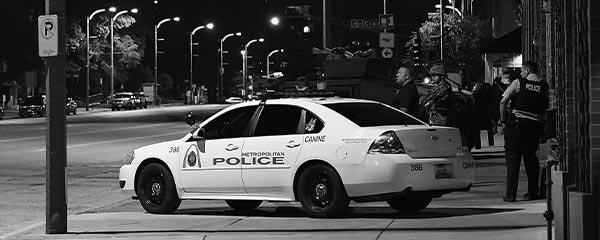Two of the extraordinary challenges confronting the nation today aren't new. The current movement for racial justice erupted in May following the death of George Floyd, a Black man killed in police custody in Minneapolis, but it originates from a much longer history of racial discrimination in the United States. And financial hardship caused by the COVID-19 pandemic is only exacerbating the economic challenges many Americans were already facing.
Standard metrics such as median household income and the unemployment rate do not show the extent to which either of these problems affects Americans' quality of life and feelings of economic security. To more effectively understand the barriers that exist to achieving a high quality of life in the fullest sense, community leaders must be proactive in listening to residents' views and experiences. The Greater Washington Community Foundation and ║┌┴¤═° recently conducted the study (Voices of the Community: DC, Maryland and Virginia) to do just that.
Earlier this year, The Community Foundation and ║┌┴¤═° conducted the Community Insights Survey throughout the Greater Washington region, spanning the District of Columbia and surrounding counties in Virginia and Maryland. The probability-based mail survey paints a picture of a region with significant economic and racial justice challenges months before COVID-19 and recent civil unrest transformed the national discourse.
Four in 10 in the Greater Washington Area Have Experienced Discrimination
When asked if they have experienced discrimination within the past year, about four in 10 Greater Washington residents report having felt discriminated against. The overall rate of self-reported discrimination is higher among Black adults (49%) and Asian adults (51%) than among Hispanic adults (41%) and White adults (33%).
| Overall | White adults | Black adults | Asian adults | Hispanic adults | |||||||||||||||||||||||||||||||||||||||||||||||||||||||||||||||||||||||||||||||||||||||||||||||
|---|---|---|---|---|---|---|---|---|---|---|---|---|---|---|---|---|---|---|---|---|---|---|---|---|---|---|---|---|---|---|---|---|---|---|---|---|---|---|---|---|---|---|---|---|---|---|---|---|---|---|---|---|---|---|---|---|---|---|---|---|---|---|---|---|---|---|---|---|---|---|---|---|---|---|---|---|---|---|---|---|---|---|---|---|---|---|---|---|---|---|---|---|---|---|---|---|---|---|---|
| % | % | % | % | % | |||||||||||||||||||||||||||||||||||||||||||||||||||||||||||||||||||||||||||||||||||||||||||||||
| Daily | 2 | 2 | 4 | 1 | 1 | ||||||||||||||||||||||||||||||||||||||||||||||||||||||||||||||||||||||||||||||||||||||||||||||
| Weekly | 3 | 3 | 3 | 3 | 6 | ||||||||||||||||||||||||||||||||||||||||||||||||||||||||||||||||||||||||||||||||||||||||||||||
| Monthly | 9 | 5 | 15 | 10 | 11 | ||||||||||||||||||||||||||||||||||||||||||||||||||||||||||||||||||||||||||||||||||||||||||||||
| Less than once per month | 26 | 23 | 27 | 37 | 23 | ||||||||||||||||||||||||||||||||||||||||||||||||||||||||||||||||||||||||||||||||||||||||||||||
| Never | 59 | 68 | 50 | 50 | 60 | ||||||||||||||||||||||||||||||||||||||||||||||||||||||||||||||||||||||||||||||||||||||||||||||
| Greater Washington Community Foundation/║┌┴¤═°, December 2019-January 2020 | |||||||||||||||||||||||||||||||||||||||||||||||||||||||||||||||||||||||||||||||||||||||||||||||||||
The most common situation in which residents perceive being discriminated against is in social interactions with people they do not know. Among Greater Washington residents, 27% cite these interactions as problematic. This is followed by 11% who say they have experienced discrimination at work and by 10% who say they've experienced it in social interactions with someone they know.
The situations least likely to be cited as problematic for Greater Washington residents include searching for housing (2%), applying for a bank loan (2%) and going to school (3%).
| Overall | White adults | Black adults | Asian adults | Hispanic adults | |||||||||||||||||||||||||||||||||||||||||||||||||||||||||||||||||||||||||||||||||||||||||||||||
|---|---|---|---|---|---|---|---|---|---|---|---|---|---|---|---|---|---|---|---|---|---|---|---|---|---|---|---|---|---|---|---|---|---|---|---|---|---|---|---|---|---|---|---|---|---|---|---|---|---|---|---|---|---|---|---|---|---|---|---|---|---|---|---|---|---|---|---|---|---|---|---|---|---|---|---|---|---|---|---|---|---|---|---|---|---|---|---|---|---|---|---|---|---|---|---|---|---|---|---|
| % | % | % | % | % | |||||||||||||||||||||||||||||||||||||||||||||||||||||||||||||||||||||||||||||||||||||||||||||||
| In social interactions with people you do not know | 27 | 20 | 32 | 32 | 32 | ||||||||||||||||||||||||||||||||||||||||||||||||||||||||||||||||||||||||||||||||||||||||||||||
| At your current job | 11 | 9 | 10 | 11 | 17 | ||||||||||||||||||||||||||||||||||||||||||||||||||||||||||||||||||||||||||||||||||||||||||||||
| In social interactions with people you know | 10 | 10 | 7 | 11 | 12 | ||||||||||||||||||||||||||||||||||||||||||||||||||||||||||||||||||||||||||||||||||||||||||||||
| When trying to find a job | 7 | 6 | 11 | 4 | 6 | ||||||||||||||||||||||||||||||||||||||||||||||||||||||||||||||||||||||||||||||||||||||||||||||
| When interacting with government officials or agencies | 5 | 3 | 7 | 4 | 8 | ||||||||||||||||||||||||||||||||||||||||||||||||||||||||||||||||||||||||||||||||||||||||||||||
| In interactions with the police | 5 | 1 | 9 | 7 | 8 | ||||||||||||||||||||||||||||||||||||||||||||||||||||||||||||||||||||||||||||||||||||||||||||||
| In a healthcare setting | 4 | 4 | 6 | 3 | 4 | ||||||||||||||||||||||||||||||||||||||||||||||||||||||||||||||||||||||||||||||||||||||||||||||
| At school or when pursuing your education | 3 | 1 | 3 | 7 | 4 | ||||||||||||||||||||||||||||||||||||||||||||||||||||||||||||||||||||||||||||||||||||||||||||||
| When banking or applying for a loan | 2 | 1 | 4 | 1 | 4 | ||||||||||||||||||||||||||||||||||||||||||||||||||||||||||||||||||||||||||||||||||||||||||||||
| When trying to obtain housing | 2 | 1 | 4 | 0 | 4 | ||||||||||||||||||||||||||||||||||||||||||||||||||||||||||||||||||||||||||||||||||||||||||||||
| Greater Washington Community Foundation/║┌┴¤═°, December 2019-January 2020 | |||||||||||||||||||||||||||||||||||||||||||||||||||||||||||||||||||||||||||||||||||||||||||||||||||
About one in 10 Black residents (9%) report feeling discriminated against during interactions with the police, compared with 1% of White residents. Also, Black residents are four times as likely as White residents to report having experienced discrimination while trying to obtain housing (4% vs. 1%, respectively).
When it comes to perceived reasons for discrimination, residents of the Greater Washington area are most likely to cite race or ethnicity (25%). Asian adults (41%) and Black adults (38%) are the most likely to say they have been discriminated against due to their race or ethnicity, followed closely by Hispanic adults (31%). The rate drops to 10% for White adults.
Gender is the second most likely reason noted across the region for discrimination, cited by 14% of residents, followed by 11% citing age. Other reasons for which more than 3% of residents perceive they've been targeted for mistreatment include income level (7%), appearance (7%) and religion (4%). Language is mentioned by 3% overall, but is more of an issue for Asian adults (10%) and Hispanic adults (7%).
| Overall | White adults | Black adults | Asian adults | Hispanic adults | |||||||||||||||||||||||||||||||||||||||||||||||||||||||||||||||||||||||||||||||||||||||||||||||
|---|---|---|---|---|---|---|---|---|---|---|---|---|---|---|---|---|---|---|---|---|---|---|---|---|---|---|---|---|---|---|---|---|---|---|---|---|---|---|---|---|---|---|---|---|---|---|---|---|---|---|---|---|---|---|---|---|---|---|---|---|---|---|---|---|---|---|---|---|---|---|---|---|---|---|---|---|---|---|---|---|---|---|---|---|---|---|---|---|---|---|---|---|---|---|---|---|---|---|---|
| % | % | % | % | % | |||||||||||||||||||||||||||||||||||||||||||||||||||||||||||||||||||||||||||||||||||||||||||||||
| Race or ethnicity | 25 | 10 | 38 | 41 | 31 | ||||||||||||||||||||||||||||||||||||||||||||||||||||||||||||||||||||||||||||||||||||||||||||||
| Gender | 14 | 16 | 12 | 8 | 18 | ||||||||||||||||||||||||||||||||||||||||||||||||||||||||||||||||||||||||||||||||||||||||||||||
| Age | 11 | 11 | 13 | 8 | 9 | ||||||||||||||||||||||||||||||||||||||||||||||||||||||||||||||||||||||||||||||||||||||||||||||
| Income level | 7 | 4 | 11 | 4 | 7 | ||||||||||||||||||||||||||||||||||||||||||||||||||||||||||||||||||||||||||||||||||||||||||||||
| Appearance (e.g., height, weight, size, tattoos, piercings) | 7 | 6 | 6 | 7 | 9 | ||||||||||||||||||||||||||||||||||||||||||||||||||||||||||||||||||||||||||||||||||||||||||||||
| Religion | 4 | 4 | 4 | 3 | 1 | ||||||||||||||||||||||||||||||||||||||||||||||||||||||||||||||||||||||||||||||||||||||||||||||
| Language | 3 | 1 | 2 | 10 | 7 | ||||||||||||||||||||||||||||||||||||||||||||||||||||||||||||||||||||||||||||||||||||||||||||||
| Because you have a child or children | 3 | 3 | 2 | 2 | 3 | ||||||||||||||||||||||||||||||||||||||||||||||||||||||||||||||||||||||||||||||||||||||||||||||
| Sexual orientation or gender identity | 3 | 3 | 4 | 1 | 2 | ||||||||||||||||||||||||||||||||||||||||||||||||||||||||||||||||||||||||||||||||||||||||||||||
| Because you do not have a child or children | 2 | 3 | 2 | 1 | 3 | ||||||||||||||||||||||||||||||||||||||||||||||||||||||||||||||||||||||||||||||||||||||||||||||
| Marital status | 2 | 3 | 1 | 1 | 4 | ||||||||||||||||||||||||||||||||||||||||||||||||||||||||||||||||||||||||||||||||||||||||||||||
| Disability | 2 | 1 | 3 | 0 | 2 | ||||||||||||||||||||||||||||||||||||||||||||||||||||||||||||||||||||||||||||||||||||||||||||||
| Pregnancy status | 0 | 0 | 0 | 1 | 0 | ||||||||||||||||||||||||||||||||||||||||||||||||||||||||||||||||||||||||||||||||||||||||||||||
| Greater Washington Community Foundation/║┌┴¤═°, December 2019-January 2020 | |||||||||||||||||||||||||||||||||||||||||||||||||||||||||||||||||||||||||||||||||||||||||||||||||||
Homelessness, Economic Insecurity Are Significant Challenges
Personal familiarity with homelessness is widespread across the region, with roughly one in three residents saying they know someone who has experienced homelessness or is at risk of becoming homeless. Optimism about solving homelessness is in relatively short supply, as 20% strongly agree that homelessness can be eliminated in the region, 6% say homelessness has decreased in the past year, and 4% strongly agree that their local government cares about addressing homelessness.
Homelessness is also an issue that many residents may identify with on an even more personal level. At the time of the survey, well before the pandemic, three in 10 Greater Washington residents reported being very or somewhat worried about paying their rent or mortgage, with substantial differences seen on this item by race. Whereas 42% of both Black residents and Hispanic residents reported being worried about affording their housing, this fell to 35% among Asian residents and 17% among White residents.
| Overall | White adults | Black adults | Asian adults | Hispanic adults | |||||||||||||||||||||||||||||||||||||||||||||||||||||||||||||||||||||||||||||||||||||||||||||||
|---|---|---|---|---|---|---|---|---|---|---|---|---|---|---|---|---|---|---|---|---|---|---|---|---|---|---|---|---|---|---|---|---|---|---|---|---|---|---|---|---|---|---|---|---|---|---|---|---|---|---|---|---|---|---|---|---|---|---|---|---|---|---|---|---|---|---|---|---|---|---|---|---|---|---|---|---|---|---|---|---|---|---|---|---|---|---|---|---|---|---|---|---|---|---|---|---|---|---|---|
| % | % | % | % | % | |||||||||||||||||||||||||||||||||||||||||||||||||||||||||||||||||||||||||||||||||||||||||||||||
| Very worried | 7 | 3 | 17 | 4 | 5 | ||||||||||||||||||||||||||||||||||||||||||||||||||||||||||||||||||||||||||||||||||||||||||||||
| Somewhat worried | 23 | 14 | 25 | 31 | 37 | ||||||||||||||||||||||||||||||||||||||||||||||||||||||||||||||||||||||||||||||||||||||||||||||
| Not too worried | 34 | 36 | 33 | 38 | 29 | ||||||||||||||||||||||||||||||||||||||||||||||||||||||||||||||||||||||||||||||||||||||||||||||
| Not at all worried | 35 | 47 | 24 | 28 | 28 | ||||||||||||||||||||||||||||||||||||||||||||||||||||||||||||||||||||||||||||||||||||||||||||||
| Greater Washington Community Foundation/║┌┴¤═°, December 2019-January 2020 | |||||||||||||||||||||||||||||||||||||||||||||||||||||||||||||||||||||||||||||||||||||||||||||||||||
Financial insecurity is generally widespread across the Greater Washington region, with more than a third of residents saying they could manage financially for less than two months if they lost their current sources of household income. Again, there is a substantial racial gap on this perception, with 56% of Black residents saying they could manage for less than two months, compared with 35% of Hispanic residents, 26% of Asian residents and 24% of White residents.
| Overall | White adults | Black adults | Asian adults | Hispanic adults | |||||||||||||||||||||||||||||||||||||||||||||||||||||||||||||||||||||||||||||||||||||||||||||||
|---|---|---|---|---|---|---|---|---|---|---|---|---|---|---|---|---|---|---|---|---|---|---|---|---|---|---|---|---|---|---|---|---|---|---|---|---|---|---|---|---|---|---|---|---|---|---|---|---|---|---|---|---|---|---|---|---|---|---|---|---|---|---|---|---|---|---|---|---|---|---|---|---|---|---|---|---|---|---|---|---|---|---|---|---|---|---|---|---|---|---|---|---|---|---|---|---|---|---|---|
| % | % | % | % | % | |||||||||||||||||||||||||||||||||||||||||||||||||||||||||||||||||||||||||||||||||||||||||||||||
| Less than a month | 19 | 14 | 35 | 9 | 13 | ||||||||||||||||||||||||||||||||||||||||||||||||||||||||||||||||||||||||||||||||||||||||||||||
| At least one month but less than two months | 16 | 10 | 21 | 17 | 22 | ||||||||||||||||||||||||||||||||||||||||||||||||||||||||||||||||||||||||||||||||||||||||||||||
| At least two months but less than six months | 22 | 22 | 19 | 23 | 24 | ||||||||||||||||||||||||||||||||||||||||||||||||||||||||||||||||||||||||||||||||||||||||||||||
| At least six months but less than a year | 19 | 21 | 14 | 18 | 22 | ||||||||||||||||||||||||||||||||||||||||||||||||||||||||||||||||||||||||||||||||||||||||||||||
| At least a year but less than two years | 11 | 15 | 4 | 16 | 10 | ||||||||||||||||||||||||||||||||||||||||||||||||||||||||||||||||||||||||||||||||||||||||||||||
| Two years or more | 14 | 18 | 8 | 17 | 9 | ||||||||||||||||||||||||||||||||||||||||||||||||||||||||||||||||||||||||||||||||||||||||||||||
| Greater Washington Community Foundation/║┌┴¤═°, December 2019-January 2020 | |||||||||||||||||||||||||||||||||||||||||||||||||||||||||||||||||||||||||||||||||||||||||||||||||||
When it comes to specific approaches for addressing the homelessness issue, roughly four in 10 residents strongly or somewhat agree that homelessness can be solved by increasing the supply of housing, and 40% agree that they would be willing to pay more taxes to help increase the supply of affordable housing.
Bottom Line
Like many Americans, residents of the Greater Washington region reported experiencing discrimination and economic challenges prior to the COVID-19 pandemic. While leaders now attempt to craft solutions aimed at the immediate needs of residents facing unprecedented job and income loss, recent events have only exacerbated challenges many were already struggling with.
To create solutions that address these systemic inequities and remove barriers to opportunity and employment, it is critical that leaders do not just look at traditional metrics but also listen to the voices of their people. Residents can provide the information needed for leaders and communities to ensure they are focused on the challenges facing people today and preparing their communities for the emerging needs of tomorrow.
Learn more about the .




